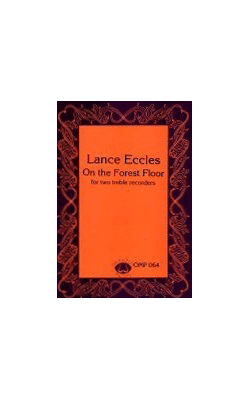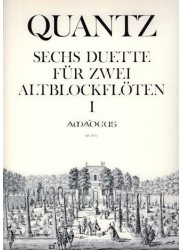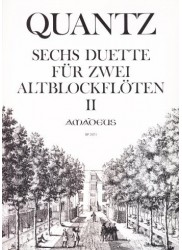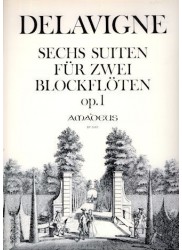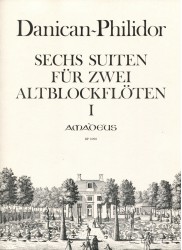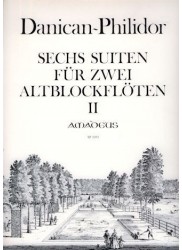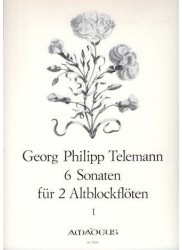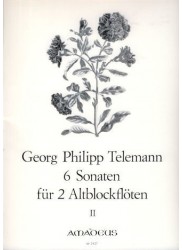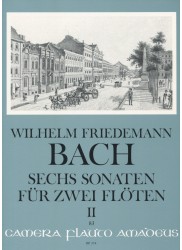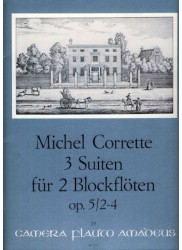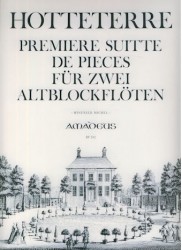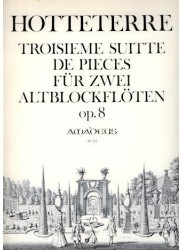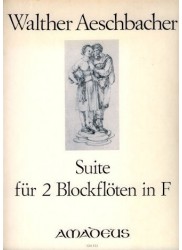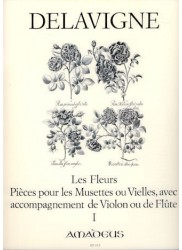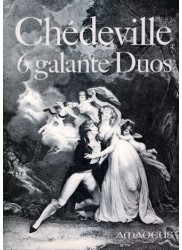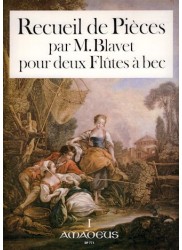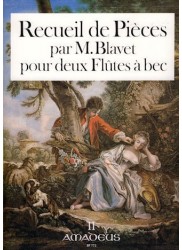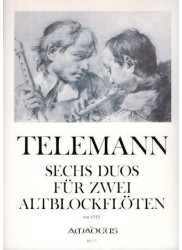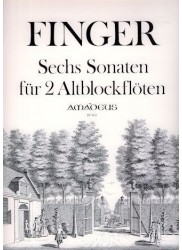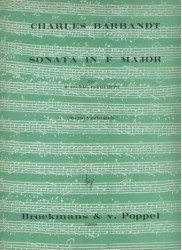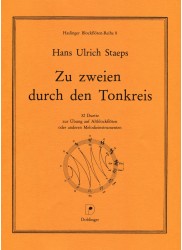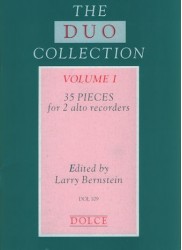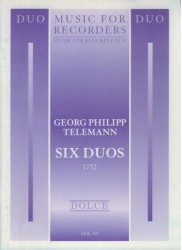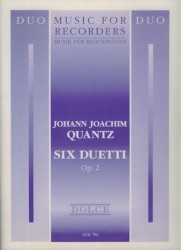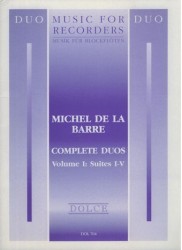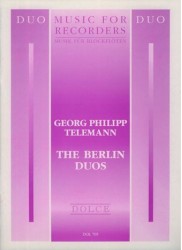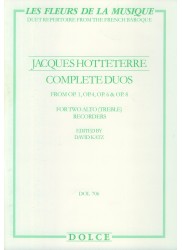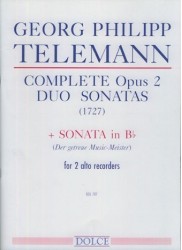No products
Prices are tax included
On the Forest Floor
Composer: Eccles - Lance
Instrumentation: 2 Trebles
Period/genre: Australian Contemporary
Grade: Moderate
More info
*Contemporary Pieces.* A group of interesting duets with attractive melodies and some piquant harmonies.
1. Lichens
2. Toads on Stools
3. Wombats Breakfast
4. Grasshoppers
5. Antechinuses
_Score 8 pp._
OMP064 Lance EcclesOn the Forest Floor
The titles of the five movements that make up Lance Eccles' On the Forest Floor certainly offer great food for thought! "Wombat's Breakfast" (mov 3) is great fun and this collection really is ideal teaching material for the intermediate player. The top part exploits the full tessitura of the alto recorder, and some interesting time changes are incorporated into the first movement "Lichens". Although suggestions for tempo are given for each movement, the text is largely absent from any other notes on performance, which is a shame, but should consequently encourage pupils' own input and creativity.
Louise Phillips, The Recorder Magazine, Winter 2001
OMP064 Lance Eccles, On the Forest Floor.
OMP078 Lance Eccles, Spangled Sonata.
Lance Eccles is a senior lecturer in Chinese at Macquarie University in Australia. He is also a member of the Sydney Society of Recorder Players and the Reluctant Consort since 1982. It is for these two groups that Eccles composes his music.
For me, these two sets of duets were an introduction to a com-poser with a unique and fascinating sound. Forest Floor is the easier of the two sets and is appropriate for moderately able players. Sonata is more suited to advanced players, but both share common elements, and neither requires extended techniques.
On the Forest Floor is a set of five duos, each of which aurally depicts items that might he found during a walk in the (Australian) woods. Individual pieces have titles like: "Grasshoppers," "Wombat's Breakfast," and (my favourite) "Antechinuses". Having titles in mind while playing the pieces allows performers and audiences to visualize the different images. "Lichens," for example, evokes a slow walk through underbrush, and grasshoppers flit capriciously around in the mind's eye. Prior to playing these pieces I had never heard of the antechinus, one of Australia's many marsupials. The music created an image in my head that turned out to be startlingly accurate, once I had the opportunity to learn more of this unusual and amusing creature: testament to Eccles' ability to create visual imagery through music.
He also uses imagery in his Spangled Sonata, though here the images are not of be everyday world, but rather fanciful pictures of reflected or refracted light: "Showers of Amethysts," "Crystal Towers" and "Shattered Moonlight." Given the abstract nature of the titles, it would not be surprising to discover that the pieces are more abstract. Nevertheless the titles and music provide a firm ground for creating your own mental image of, say, a shower of amethysts (whatever that may be).
Musically the most remarkable features of these two sets are the harmonic structure of the pieces and the rhythms used in them. Eccles favours dissonance throughout the pieces. The harmonies are liberally peppered with seconds, sixths, sevenths and often diminished seconds or augmented sevenths (E against Eb, F# against G). The pieces, though, never sound abrasive or jarring, and they don't fluctuate between consonance and dissonance. Rather they are, at times, awash with a fullness of tone similar to that of an accordion or mouth organ. This quality is more prevalent in Sonata, where fragmented harmonies help create the effect of scattered light. Eccles uses syncopated rhythms in both Sonata and Forest Floor, often setting two voices against one another, but the rhythms in Sonata are more complex. Its time signatures are generally mutable, changing every bar or two: those in Forest Floor are consistent within each movement.
I would like to point out that the Orpheus Music web site has new features that take some guess work out of purchasing new compositions. Most of their publications are now listed on the website, along with short sound clips of the music and a scanned image of each first page. While still not the same as browsing through sheet music in a store, the features give a clearer idea of the music than words alone can and take away a bit of the gamble involved in shopping over the internet.
Geoffrey Allen, American Recorder, March 2004
30 other products in the same category:
Reference: BP2070
Brand: Amadeus
Six Duets Op 2 Vol 1
Composer: Quantz - Johann Joachim Arranger: Ed Bernhard Pauler...
In StockReference: BP2071
Brand: Amadeus
Six Duets Op 2 Vol 2
Composer: Quantz - Johann Joachim Arranger: Ed Bernhard Pauler...
In StockReference: BP2085
Brand: Amadeus
Six Suites Op 1
Composer: Delavigne - Philibert Arranger: Ed Winfried Michel...
In StockReference: BP2090
Brand: Amadeus
Six Suites Op Vol1
Composer: Danican-Philidor - Pierre Arranger: Ed Andreas Habert...
In StockReference: BP2091
Brand: Amadeus
Six Suites Volume 2
Composer: Danican-Philidor - Pierre Arranger: Ed Andreas Habert...
In StockReference: BP2426
Brand: Amadeus
Six Sonatas Volume 1
Composer: Telemann - Georg Philipp Arranger: Ed Winfried Michel...
In StockReference: BP2427
Brand: Amadeus
Six Sonatas Volume 2
Composer: Telemann - Georg Philipp Arranger: Ed Winfried Michel...
In StockReference: BP2530
Brand: Amadeus
Six Suites D'Airs
Composer: Marchand - Jean NoelArranger: Ed Yvonne MorganInstrumentation: 2...
In StockReference: BP374
Brand: Amadeus
Six Sonatas for Two Recorders Vol II
Composer: Bach - W.F.E. Arranger: Oskar Peter Instrumentation: 2 Trebles...
In StockReference: BP379
Brand: Amadeus
Three Suites Op5 Nos 2-4
Composer: Corrette - MichelInstrumentation: 2 TreblesPeriod/genre:...
In StockReference: BP392
Brand: Amadeus
Premiere Suite De Pieces No1 Op4
Composer: Hotteterre - Jacques-Martin Instrumentation: 2 Trebles...
In StockReference: BP422
Brand: Amadeus
Six Sonatas Op 6
Composer: Valentine - Robert Instrumentation: 2 Trebles Period/genre:...
Out of stockReference: BP432
Brand: Amadeus
Troisieme Suite De Pieces No3 Op8
Composer: Hotteterre - Jacques-Martin Instrumentation: 2 Trebles...
In StockReference: GM522
Brand: Amadeus
Suite for two Treble Recorders
Composer: Aeschbacher - Walther Instrumentation: 2 Trebles Period/genre:...
In StockReference: BP553
Brand: Amadeus
Les Fleurs Op4 Vol 1
Composer: Delavigne - Philibert Instrumentation: 2 Trebles Period/genre:...
Out of stockReference: BP770
Brand: Amadeus
Six Galant Duos Op5
Composer: Chedeville - Esprit-Philippe Arranger: Ed Bernhard Pauler...
In StockReference: BP771
Brand: Amadeus
Recueil de Pièces, Vol 1
Composer: Blavet - Michel Arranger: Yvonne Morgan & Winfried Michel...
In StockReference: BP772
Brand: Amadeus
Recueil de Pièces, Vol 2
Composer: Blavet - Michel Arranger: Ed Yvonne Morgan & Winfried Michel...
In StockReference: BP777
Brand: Amadeus
Six Duos for 2 Trebles from 1752
Composer: Telemann - Georg Philipp Arranger: Bernhard Pauler...
In StockReference: BP780
Brand: Amadeus
Six Sonatas
Composer: Croft - WilliamArranger: Ed Bernhard PaulerInstrumentation: 2...
In StockReference: BP802
Brand: Amadeus
Six Sonatas Op 2
Composer: Finger - Gottfried Arranger: Ed Yvonne Morgan Instrumentation: 2...
In StockReference: BRVP1209
Brand: Broekmans en van Poppel
Sonata in F Major
Composer: Barbandt - CharlesInstrumentation: 2 TreblesPeriod/genre:...
In StockReference: DOHBR8
Brand: Doblinger
Zu zweien durch den Tonkreis
Composer: Staeps - Hans Ulrich Instrumentation: 2 Trebles Period/genre:...
In StockReference: DOL109
Brand: Dolce
The Duo Collection Vol 1
Composer: Various Arranger: Larry Bernstein Instrumentation: 2 Trebles...
In StockReference: DOL701
Brand: Dolce
Six Duos (1752)
Composer: Telemann - Georg Philipp Arranger: Ed David Katz Instrumentation:...
In StockReference: DOL702
Brand: Dolce
Six Duetti Op 2 (1759)
Composer: Quantz - Johann Joachim Arranger: Ed Bernard Thomas...
In StockReference: DOL704E#
Brand: Dolce
Complete Duos, Vol 1
Composer: La Barre - Michel de Arranger: Ed David Katz Instrumentation: 2...
$27.50 -30%In StockReference: DOL705
Brand: Dolce
The Berlin Duos
Composer: Telemann - Georg PhilippArranger: Ed David KatzInstrumentation: 2...
Out of stockReference: DOL706
Brand: Dolce
Complete Duos
Composer: Hotteterre - Jacques-Martin Arranger: Ed David Katz...
In StockReference: DOL707
Brand: Dolce
Complete Opus 2 Duo Sonatas (1727) and Sonata in B flat Major
Composer: Telemann - Georg Philipp Arranger: Ed Bernard Thomas...
Out of stock

